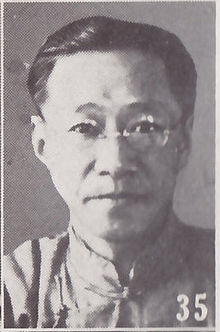Weng Wenhao
| Weng Wenhao | |
|---|---|
| 翁文灝 | |
 |
|
| Premier of the Republic of China | |
|
In office 24 May 1948 – 26 November 1948 |
|
| President | Chiang Kai-shek |
| Personal details | |
| Born | 26 July 1889 Ningbo, Zhejiang, Qing Dynasty |
| Died | 27 January 1971 (aged 81) Beijing, China |
| Nationality | Republic of China |
| Political party | Kuomintang |
| Alma mater | Catholic University of Leuven |
Weng Wenhao (simplified Chinese: 翁文灏; traditional Chinese: 翁文灝; pinyin: Wēng Wénhào; 26 July 1889 – 27 January 1971) was a Chinese geologist, educator, and paramount politician.
He was one of the earliest modern Chinese geologists, and is regarded as the founder of modern Chinese geology and the father of modern Chinese oil industry in much literature.
From May to November 1948, Weng served as the President of the Executive Yuan of the Republic of China. The position is most commonly referred to as prime minister or premier.
He was born in 1889 in Cixi, Ningbo, Zhejiang Province in late Qing Dynasty, and his courtesy name was Yongni (咏霓). His father was a locally famous businessman.
In 1902, he was only a 13-year-old boy but won the title of "skillful writer" (秀才) in the Imperial Examination. Later, he went to Shanghai and then entered a French-speaking Catholic school there.
He obtained his doctor's degree on geology from the Catholic University of Leuven, Flanders, Belgium, in 1912. He was the first Chinese person to hold a western doctor's degree in geology.
In 1912, after obtaining his doctor's degree in geology, he went back to China. He served as the Minister of Mine Industry and the Minister of Agriculture and Commerce, Beiyang Government. At the same time, he was also a lecturer and the chief professor (director, from 1914) of the National Research Institute of Geography. Together with Ding Wenjiang, he founded the new National Geological Survey.
...
Wikipedia
